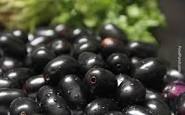Health benefits of Jamun – Eating Indian jamun fruit helps in the treatment of Piles, Diarrhoea and Dysentery, Liver disorders, Polyuria and female sterility
Natural health benefits of Jamun fruit!
Description of jamun or jambul
The jamun also called jambul fruit is a well-known common fruit. It has two varieties. The big one is oval in shape and is commonly called as Suva-jamun.
The small one is round in shape and is commonly called as Kutta-jamun. The bigger variety is sweeter than the smaller one.
The fruit is a juicy berry with a single stone. It is black outside and violet inside; has a sourish-sweet pulp and greenish yellow seed.
Origin and Distribution
The jambul fruit has been cultivated in the Indo-Malaysian region for a long time. It is considered to be native of India or further east, but is now found in all tropical regions and grows abundantly during the rainy season. It is a common tree, found wild or cultivated in most parts of India.
Natural health benefits of jamun fruit and its curative properties
Diabetes
The jamun fruit is regarded in traditional medicine as a specific against diabetes because of its effect on the pancreas. The fruit as such, the seeds and fruit juice are all useful in the treatment of this disease.
The seeds contain a glucose ‘Jamboline’ which is believed to have the power to check the pathological conversion of starch into sugar in cases of increased production of glucose.
They are dried and powdered. This powder in doses of three grams should be given three or four times a day mixed in water. It reduces the quantity of sugar in urine and allays the unquenchable thirst.
In Ayurveda, the inner bark of the jambul tree is also used in the treatment of diabetes. The bark is dried and burnt, which produces an ash of white colour.
This ash should be pestled in the mortar, strained and bottled. The diabetic patient should be given 65 mg. of this ash on an empty stomach with water in the morning and 135 mg. each in the afternoon and in the evening, an hour after meals, if the specific gravity of the urine is 1.02 to 1.03.
If the specific gravity ranges between 1.035 and 1.055, the ask should be given thrice daily in the quantity of about 2 gm. At a time.
Polyuria
The powder of the seeds is valuable in polyuria or production of excess urine. It should be taken in dose of 1 gm. In the morning and evening.
Diarrhoea and Dysentery
Powder of the seed is an effective remedy for diarrhoea and dysentery. About 5 to 10 gm. of this powder should be taken with butter-milk in these conditions.
An infusion of the tender leaves, which contain a high concentration of gallic and tannic acid is also given as a medicine in diarrhoea and dysentery.
This infusion, prepared from 30 or 60 gm. of leaves, should be given twice or thrice daily. A decoction of the bark taken with honey is also an useful medicine for chronic diarrhoea and dysentery.
Piles
The jamun fruit is an effective food remedy for bleeding piles. The fruit should be taken with salt every morning for two or three months in its season.
The use of the fruit in this manner in every season will effect radical cure and save the user from bleeding piles for entire life. Fresh jamun fruit taken with honey is also an effective medicine for bleeding piles.
Liver Disorders
Natural acids in the jambul fruit play an important role in the secretion of digestive enzymes and stimulate the liver functions. Charaka, the well-known physician of the ancient India, used this fruit in the treatment of enlargement of the liver.
Female sterility
An infusion of the fresh tender leaves of jamun fruit, taken with honey or butter-milk, is an effective remedy for sterility and miscarriage due to overian or endometrium functional disorder. The leaves presumably stimulate the secretion of progrestrone hormone and help absorption of vitamin E.
Important precaution
The jamun fruit should not be consumed in excess. Its excessive use is bad for throat and chest. It may cause cough and accumulation of sputum in the lungs.
RELATED TOPICS
Health insurance companies in UAE


